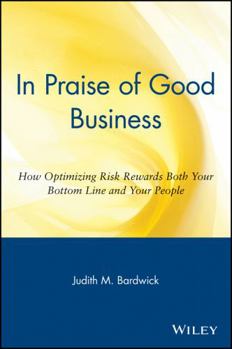In Praise of Good Business: How Optimizing Risk Rewards Both Your Bottom Line and Your People
Select Format
Select Condition 
Book Overview
Ein neuer Stil des Personal-Managements: Die Autorin stellt ihr Konzept der 'produktiven Unsicherheit' vor. Kernpunkt des Ansatzes ist, das Personal durch Risiko und Verantwortung herauszufordern, ohne es zu berfordern - denn beide Extreme, zu viel und zu wenig Stre , sind Gr nde f r das Scheitern von Unternehmen. Elegant und intelligent geschrieben, d rfte das Werk f r ein breites Publikum aus der Gesch ftswelt interessant sein. (06/98)
Format:Paperback
Language:English
ISBN:047125407X
ISBN13:9780471254072
Release Date:April 1998
Publisher:Wiley
Length:368 Pages
Weight:1.21 lbs.
Dimensions:0.9" x 6.1" x 9.0"
Related Subjects
Business Business & Finance Business & Investing Economics Management Management & LeadershipCustomer Reviews
3 ratings
A culture of accountability
Published by Thriftbooks.com User , 19 years ago
Too many companies today have a culture of entitlement, says Judith M. Bardwick. Employees believe that their jobs and benefits are owed to them. They expect equal treatment, even if their work is not equal to the work of others. When rewards are distributed equally among employees, those who do good work are not really rewarded or recognized and those whose performance is poor are not held accountable. Managers and employees avoid taking risks. Companies lose sight of their market and begin to lose their competitive edge. You end up managing to morale, instead of managing for results. What is needed, says the author, is to replace the culture of entitlement with a culture of accountability. However, creating a culture of accountability will not be easy. Entrenched management and employees will resist your efforts to change the company. The author presents the following tips for changing the culture of your company to one of accountability: · Select the people who will help you change. Look for mavericks in your company, or bring in outsiders if necessary. You may need to fire people who consistently work against change. · Commit to your employees conditionally. Employees who are too anxious about losing their jobs will not be at their best. Make it clear that job security and benefits will be rewards for fulfilling company goals and obligations. · Create a sense of urgency in employees about the organization's business goals. Make sure that employees know how their own interests are related to the interests of the company. · Encourage collaboration and cohesion among employees and work units. Collaboration reduces costs and internal boundaries to innovation. Cohesion helps to ensure seamless delivery of your product to customers. · Build trust in your company by always telling the truth. · Concentrate on work that has purpose. Eliminate "busy" work. · Find the right methods to achieve the right goals, not just the methods currently fashionable.
AND BEY0ND THE COMFORT ZONE TOWARD JUST-RIGHT LEVEL of RISK.
Published by Thriftbooks.com User , 25 years ago
The theme of this work is moving from a low-risk, 'no consequence' culture to a results-driven organization where risk is at an ideal level, a concept based on the Yerkes Dodson Law. Characteristics of successful organizations and management are examined in terms of achieving change through driving for measurable success and rewarding and punishing, thereby bringing about a results-driven mind-set requiring: urgency, leadership, purpose, collaboration, selection, method, trust, and commitment. This work is absorbing, informative and recommended. It carries forward themes that the author introduced in "Danger in the Comfort Zone," another noteworthy book that we recommend you read. Reviewed by Gerry Stern, founder, Stern & Associates, author of Stern's Sourcefinder The Master Directory to HR and Business Management Information & Resources, Stern's CyberSpace SourceFinder, and the Compensation and Benefits SourceFinder.
A Superb Look How To Create More Stretch In Your Company
Published by Thriftbooks.com User , 26 years ago
I am a corporate strategy consultant and business book author. Many companies that I work with would benefit from reading and applying this book. Companies flourish when they take on tougher challenges, using the right tools. In some companies, great rewards are provided for "below average" performance. One of the things that impressed me about this book is that Judith Bardwick has changed her philosophy since DANGER IN THE COMFORT ZONE. I thought that book was a little unrealistic. She has learned from her experiences since then that giving companies maximum current earning's performance makes leaders arrogant and unresponsive in some cases. This can lead to problems later. She now suggests that companies operate with a little less profits in the near term, and a little more anxiety. In a sense, she is suggesting something closer to the Andy Grove model in ONLY THE PARANOID SURVIVE. Anyone who is interested in improving corporate performance should read this book and apply its lessons. I look forward to her next book to see what new lessons she will have learned since writing this book.






